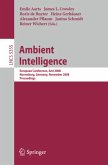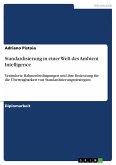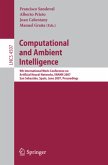Ambient intelligence (AmI) is a new research area in computer science that shall enable human users to interact with their physical environment seamlessly. The ultimate vision is that users are embedded in AmI environments that adapt to them and provide services without putting the burden of manual configuration and explicit interaction on them. This book is dedicated to the question of how this vision can be realized. We propose a model, called Ad-hoc Service Grid (ASG), for deploying AmI in arbitrary locations. An ASG consists of PC-like computers that are distributed over a location in a Drop-and-Deploy fashion and provide a communication network as well as computing resources. We present an ensemble of different software technologies that can build the foundation for future ASG-based Ambient Intelligence systems. They enable the ASG to self-organize in order to adapt to dynamic user behavior. This book is addressed to engineers, scientists, and students who do research in thearea of AmI. It provides deep insights into AmI technologies and puts them into perspective. Moreover, this book takes a step towards a common understanding of self-organizing software systems in general.
Bitte wählen Sie Ihr Anliegen aus.
Rechnungen
Retourenschein anfordern
Bestellstatus
Storno








